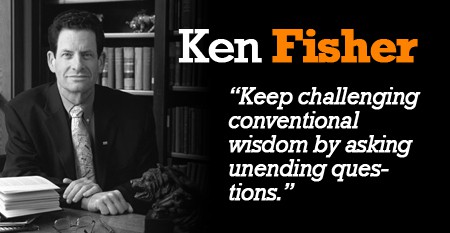Ken Fisher is perhaps one of the most fascinating men of our time. He possesses both incredible intellect and genuine humility. He is a true renaissance man…A family man who has been married for 36 years, the best selling author (his current book The Only Three Questions That Count is ranked #14 on the NY Times Hardcover Bestseller list), The CEO of Fisher Investments, one of the most successful investment firms in the world, his monthly “Portfolio Strategy” column in Forbes magazine makes him the fifth-longest running columnist in the magazine’s 89-year history and a man with a sense of character and responsibility. Oh, I neglected to mention he also happens to be ranked #297 on the Forbes 400 list of wealthiest Americans (estimated to be worth more than $1.3 billion dollars). In today’s post, you’ll read my interview with Ken Fisher one of the real “good guys” in business. I hope you enjoy it as much as I did…
Mike Myatt: Ken, you’re widely regarded as one of the most successful and savvy investors in modern history; to what do you attribute your success?
Ken Fisher: While I may be thought of by some that way because of the success of my firm and my visibility, I don’t see myself that way. Regardless, getting to wherever I am is because I was born lucky. Among other things my father, who was a big name investor and free thinker in his early years, taught me to be a very free thinker who was free to go where others typically restrict themselves from. I also possess a strong work ethic. I bathe and floss almost daily and question the hell out of everything that is otherwise regarded as conventional wisdom since so much of it is nonsense. I’m hell on questions and questioning.
Mike Myatt: It was your theoretical work that led to the development of the Price/Sales Ratio. At what point did you realize this ratio was meaningful?
Ken Fisher: In the 1975-76 period on the aftermath of the bear market and recession, stocks would go through the roof in volume with no earnings. I’d see that over and over again and it got me thinking and questioning what caused that. Then to testing! By 1978 I had fashioned the concept as a metric and was regularly using it and in that period it was a market beater as a simple filter rule. By the early 1980s, I’d done a lot of stat work to demonstrate efficacy and that kept on evolving until and through my first book which first popularized the concept.
Mike Myatt: In addition to your obvious affinity for the stock market you also have amassed a considerable real estate portfolio. How did you get started in real estate and what advice would you give to our readers?
Ken Fisher: Really, I have no passion at all for real estate–just have to use the stuff. 35 years ago I owned a home I lived in while at college as a fixer-upper (and did a lot of construction type activities while working through college). And later I owned homes here on the mountain where I reside. But today, effectively my only property is that on which my firm operates (Except in Britain and Vancouver, Washington – we rent there). But, yes, from that I own 285,000 square feet of Class A office space in the Bay Area where most of our employees are and where we have expansion space-and then our smaller 22,000 headquarters building on Kings Mountain, above the Bay Area which is also where I live in a small, 2500 foot apartment above the operating facility. But it is those buildings you’re referencing. So, there is no passion for real estate. But if you’re operating a business you have much more control with ownership than as a tenant and inside our firm, we do have a passion for control at every step of the process.
Mike Myatt: With more than $30 billion dollars under management for institutional and private clients you are much more than a money manager, you are also the CEO of a very successful business. What would you say is your greatest “business” talent?
Ken Fisher: More than $36 billion but who is counting? As a CEO my greatest strengths are 1) being the visionary that envisions our firm’s future down the road, 2) creating a culture that gets great young people to be over-the-top loyal and energetic toward the firm, 3) delegating and except in some areas that most directly affect me not being a micro-manager. We have a very different corporate culture than almost all firms in our industry and we push agendas others don’t. We almost exclusively hire and promote from within. We by-pass the MBA world trying to hire kids right out of college before the MBA world and then motivate them to never leave-like firms did 40 years ago in a world that has now, other than here, vanished. We can’t compete with the big firms for MBAs but can get hold of the kids before they go to MBA school and hang on to them and compete that way. We have the industry’s only formally designated Chief Innovation Officer, one of the few in the world in any industry. We are the biggest direct marketer in our industry by a wide margin-something our competitors still see as not working. We just created the industry’s first 30-minute infomercial with Hal Holbrook as our corporate spokesperson. We are always trying to do what no one else has done yet-either ever or in our industry. We ban concepts like “best practices” (which are great if a lousy firm wants to become a B-firm) in favor of what we call “Never-done-yet-practices” by which we mean to define what will become future trend changers others will have to follow. We like doing the new and never done.
Side-bar: I agree completely with Ken’s comments on best practices and would suggest that readers interested in this line of thinking read “Why Best Practices – Aren’t” which is a post I previously authored on this subject…Great minds think alike…Okay, back to the interview…
Mike Myatt: What do you consider to be your highest and best use activity during the business day? What are you doing when you’re “in the zone?”
Ken Fisher: Spending time with my wife of 36 years. No comments on the zone thing! Also, she works for the firm and has almost forever.
Mike Myatt: As a published author of 4 books and a columnist of 22 years for Forbes magazine you are obviously a talented writer. But my question is what do you enjoy reading and who are your favorite authors?
Ken Fisher: My all-time favorite author is Stewart Holbrook, hands down, now long deceased. I’m a big lumbering history fan and over the years have read and collected an awful lot on lumbering history in all it forms with a particular emphasis on redwood lumbering history. Most of the fiction I’ve read in my life has been old lumbering history novels from an era when lumbering was big in America, 1880-1960. A classic example would be Peter Kyne’s “Valley of the Giants” from 1913. You can find a number of copies of it on ABEbooks.com, which oh, by the way, as detailed at some length in my new book, “The Only Three Questions That Count” is by far and away from the best and cheapest major used book search engine and if any of your readers haven’t tried it they owe themselves a treat. In non-fiction, I get a steady bombardment of requests, often from clients, to read business and investing books most of which are truly dreadful. But I plow through or skim a lot of them over time. The world creates few great books in any year and a lot of lousy ones. Right now, I’ve been enjoying “Galileo’s Daughter”, which is a very nice and thought-provoking book. I’ve just finished a galley version of Richard Preston’s “The Wild Trees” which is coming out soon and is a chronicling of the exploits of my friend Steve Sillett and others and should make a great book and movie.
Mike Myatt: With your business endeavors being as vast as they are how have you kept a work/life balance? What tips can you give our readers about maintaining perspective on what’s really important in life?
Ken Fisher: Don’t know much about that! I’ve no ability to monitor or measure myself in those ways-certainly no expert in that. While I’ve stayed married 36 years and that is an accomplishment, how do you measure the rest? Maybe the best way is just simply how you feel about what you’re doing and if you would prefer to be doing something else. Or would you do something else if your mother was watching? Or how much of your last 15 years would you re-do if you could? And how much of this year would you re-do if you could? As implied by the title of my new book, I think most of my life in some ways comes down to continuing to ask the right questions over and over again.
Mike Myatt: Who do you respect most in the world of business?
Ken Fisher: Bill Gates. He changed the world and didn’t change himself.
Mike Myatt: If you could give one piece of advice to our readers what would that be?
Ken Fisher: Keep challenging conventional wisdom by asking unending questions. Most of our conventional wisdom is simply that and often wrong hand-me-downs from the past.
Mike Myatt: What’s next for Ken Fisher?
Ken Fisher: More questions!
Mike Myatt: Is there anything else that you’d like to share with our readers?
Ken Fisher: More questions but I haven’t thought them up yet. So far I’ve already given the best three I have.
Thanks to Ken Fisher for the giving of his valuable time for this interview. Buy his new book and if you have discretionary investment funds my suggestion would be to go with the innovator and stay away from the herd mentality of the masses.







